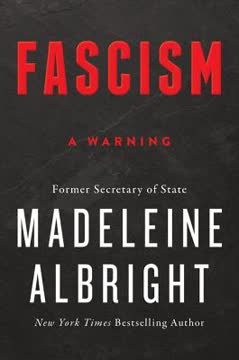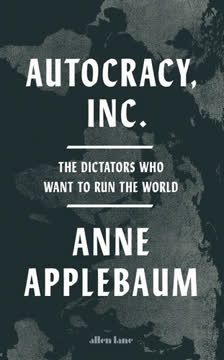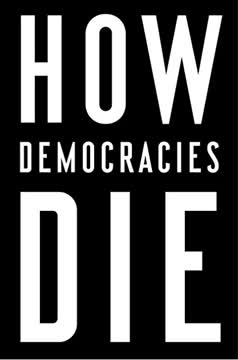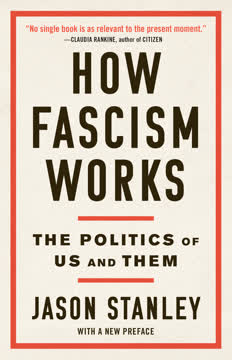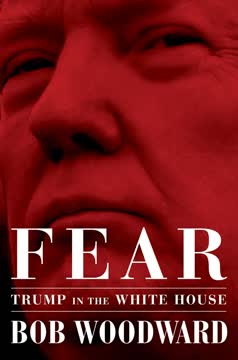Key Takeaways
1. Fascism: A Doctrine of Anger, Fear, and the Allure of Order
Fascism is an extreme form of authoritarian rule. Citizens are required to do exactly what leaders say they must do, nothing more, nothing less.
A wound from the past. Fascism, a term often misused, is a dangerous political innovation rooted in anger and fear, exploiting widespread dissatisfaction by promising simple solutions and a return to national greatness. Madeleine Albright, whose family twice fled totalitarian regimes, describes it as a wound that Donald Trump's presidency has "ripped off the bandage and picked at the scab," bringing its relevance back to the forefront of global discourse. It thrives when social anchors are absent, and people yearn for a strong hand against a perceived "evil other."
Core characteristics. Fascism is less an ideology and more a means of seizing and holding power, characterized by rabid nationalism, authoritarianism, and a disdain for the rights of others. It turns the traditional social contract upside down: power begins with the leader, and the people's mission is to serve, not to have rights. Key elements include:
- "Us against them" mentality
- Charismatic leaders who forge emotional links with crowds
- Willingness to use violence
- Control of information and media
- Exploitation of economic stress and humiliation
Historical context. The early 20th century, marked by technological disruption, economic hardship, and the devastation of World War I, created fertile ground for Fascism. Disillusionment with representative parliaments and a search for new answers led many to embrace leaders who promised renewal and a restoration of stolen pride. This era saw the rise of influential thinkers questioning traditional moorings, and a widespread sense that old political structures were failing, setting the stage for radical change.
2. Mussolini's Blueprint: The Spectacle of Power and the Plucking of the Chicken
This was how twentieth-century Fascism began: with a magnetic leader exploiting widespread dissatisfaction by promising all things.
From Socialist to strongman. Benito Mussolini, a former Socialist firebrand, transformed himself into a patriotic butterfly, founding the Fascist movement in Italy amidst post-World War I chaos and fear of Bolshevism. He skillfully exploited the nation's economic turmoil, the perceived weakness of parliament, and the unfulfilled promises of victory, offering a compelling alternative to both capitalism and socialism. His rise was marked by a blend of charisma, calculated violence, and a talent for political theater.
Seizing and consolidating power. Mussolini's "March on Rome" in 1922, more a celebratory parade than a coup, propelled him to power without winning an election, by constitutional means. Once in office, he systematically dismantled democratic institutions, abolished rival parties, and controlled the press, all while presenting himself as a capable leader who made the trains run on time. His tactics included:
- Organizing armed "Blackshirt" squads to intimidate opponents
- Demanding absolute authority from parliament
- Purging civil servants and expanding internal surveillance
- Turning schools into "seminaries for true believers"
- Adopting an aggressive, expansionist foreign policy
The showman's downfall. Mussolini, known as Il Duce, relished the spectacle of power, posing for dramatic photos and commissioning grandiose monuments. He believed the masses wanted a show and that his instincts were infallible. However, his hubris and poor judgment, particularly in military strategy and economics, ultimately led to Italy's unpreparedness for modern warfare and his eventual downfall. His observation that accumulating power is like "plucking a chicken—feather by feather" became a chilling metaphor for the gradual erosion of freedom.
3. Hitler's Escalation: From "Legal Revolution" to Unimaginable Cruelty
The reactionary forces believe they have me on the lead. . . . They regard me as an uneducated barbarian. Yes, we are barbarians. We want to be barbarians. It is an honorable title.
A man of livid fury. Adolf Hitler, an Austrian-born WWI veteran, rose to power in Germany by exploiting deep-seated grievances, hyperinflation, and the humiliation of the Versailles Treaty. He joined the German Workers' Party (later Nazis) and, despite a failed putsch, used a "policy of legality" to gain influence. His mesmerizing oratory, filled with "colossal untruths" and anti-Semitic vitriol, resonated with a populace seeking a scapegoat for their nation's disgrace.
Dismantling democracy. Appointed chancellor in 1933, Hitler swiftly used the Enabling Law to bypass the constitution and govern by decree, systematically destroying German democracy. He abolished local assemblies, purged the civil service, banned Jews from professions, and placed media under Joseph Goebbels' control. The "Night of the Long Knives" eliminated internal party threats, solidifying his control over the military and paving the way for him to become Führer upon Hindenburg's death. His methods included:
- Brutalizing political opponents with the Sturmabteilung (SA)
- Establishing concentration camps
- Dismantling labor unions
- Consolidating political and police functions under the Gestapo
- Demanding personal allegiance from the army
The "Hitler myth" and its end. Hitler's regime created an economic boom, fueled by rearmament, and a powerful propaganda machine that fostered the "Hitler myth"—the belief that he was an infallible leader who would restore Germany's greatness. However, his unyielding will and underestimation of his enemies, particularly Russia's resilience, led to the disastrous invasion of the Soviet Union. The two-front war and the Allies' relentless advance ultimately led to his bunker suicide, leaving behind a legacy of unimaginable cruelty and the horrors of the Holocaust.
4. The Incremental Erosion of Democracy: A Step-by-Step Descent
To live in this process is absolutely not to be able to notice it—please try to believe me. . . . Each step was so small, so inconsequential, so well explained or, on occasion, “regretted,” that, unless one were detached from the whole process from the beginning . . . one no more saw it developing from day to day than a farmer in his field sees the corn growing.
The insidious creep. Fascism rarely makes a dramatic, sudden entrance; instead, it advances through a series of small, seemingly inconsequential steps, gradually eroding democratic norms and institutions. This incremental nature makes it difficult for citizens to perceive the danger until it's too late, as described by a German who lived through the Third Reich. Each "plucked feather" of freedom makes the next step shorter, normalizing what was once objectionable.
Undermining core institutions. Leaders with authoritarian tendencies, whether Fascist or not, target the pillars of open government to consolidate power. This includes:
- Legislature: Undermining its authority, bypassing it, or turning it into a rubber stamp.
- Judiciary: Packing courts with loyalists, suspending judges, or ignoring rulings.
- Media: Discrediting, controlling, or shutting down independent news outlets.
- Civil Society: Suppressing dissent, outlawing opposition parties, or harassing NGOs.
- Electoral Process: Rigging votes, restricting access, or discrediting results.
The danger of complacency. The belief that "it can't happen here" is a significant vulnerability. Americans, with their deep faith in democratic resilience, risk ignoring the gradual erosion of their institutions. When politicians prioritize partisan spats over national needs, they leave a "gaping hole" in the vital center, creating a vacuum that demagogues can exploit. The lack of a shared information base, fueled by media bubbles and fake news, further divides society and makes it harder to recognize and resist these incremental changes.
5. Post-Cold War Nationalism: The Resurgence of Tribalism and Illiberalism
The world—East and West—had paid an unconscionable price to withstand the folly unleashed by their “fanatical brains.” However, this did not mean that as history moved from hot war to cold, the Soviet Union and its adversaries would view nationalism in the same light.
A new era of old hatreds. The end of the Cold War, initially hailed as a triumph for democracy, unleashed pent-up forces of sectarian anger and nationalism that the Soviet bloc had long suppressed. While some nations eagerly embraced Western integration, others saw an opportunity to revive tribal instincts and national mythologies, leading to devastating conflicts like the Bosnian War and the Kosovo crisis. This period highlighted that nationalism, while a basic human instinct, can curdle into resentment and aggression when taken too far.
Illiberal democracy's rise. In countries like Hungary and Poland, leaders like Viktor Orbán and Jarosław Kaczyński have championed "illiberal democracy," a system that respects majority will but disregards minority rights. They exploit historical grievances, promote ethnic pride, and demonize external influences (like the EU or foreign-funded NGOs) to consolidate power. Their tactics include:
- Rewriting constitutions to expand executive power
- Controlling constitutional courts and election commissions
- Reshaping educational curricula and state media
- Fostering coziness between government and oligarchs
- Using plebiscites to spread and validate falsehoods
Europe's Achilles' heel. The European Union, born from the desire to prevent a return to Fascism, now faces internal challenges from these nationalist movements. While economic integration remains logically compelling, the emotional appeal of a unified Europe has waned. Concerns about immigration, cultural identity, and bureaucratic overreach fuel nativist sentiments, leading to phenomena like Brexit and the rise of far-right parties across the continent. These movements, often supported by external actors like Russia, threaten to unravel decades of progress towards a more stable and civilized Europe.
6. The Global Autocrat Playbook: Modern Leaders Mimicking Old Tactics
Putin has feet of clay. The Russian economy, so robust in his first decade of rule, remains smaller than Italy’s or Canada’s and shows no promise of further improvement.
The KGB's legacy. Vladimir Putin, a former KGB operative, rose to power in Russia by exploiting post-Soviet chaos and a desire to restore national greatness. He has systematically dismantled democratic institutions, concentrated power among former security officials, and used disinformation as a weapon. His "vertical state" relies on a Potemkin village of fake opposition and controlled media, while suppressing dissent through dubious arrests and unexplained murders. Putin's tactics, rooted in his KGB past, include:
- Discrediting democracy and accusing the West of trying to weaken Russia
- Using cyberwarfare to meddle in foreign elections
- Employing allegations of treason to neutralize domestic opponents
- Staging public spectacles to project an image of strength and national pride
- Aggressive foreign policy (Crimea, Ukraine, Syria) to assert global influence
Chávez and Erdoğan: Populism to authoritarianism. Hugo Chávez in Venezuela and Recep Tayyip Erdoğan in Turkey exemplify how charismatic leaders can leverage populist appeal to gradually become authoritarian. Chávez, initially a problem-solver, indulged his wrath by vilifying opponents and consolidating power through constitutional changes and control over state institutions. Erdoğan, a successful mayor, used economic prosperity and religious conservatism to gain a supermajority, then systematically undermined secular institutions and suppressed dissent, especially after a failed coup attempt. Both leaders:
- Used anti-American rhetoric to rally support
- Controlled media and suppressed opposition
- Appointed loyalists to key positions
- Embraced spectacle and direct communication with the masses
North Korea: The ultimate totalitarian state. The Kim dynasty in North Korea represents the extreme end of this spectrum, a totalitarian state built on lies, fear, and the cult of personality. Kim Il-sung, Kim Jong-il, and Kim Jong-un have maintained power through:
- A fabricated history of national defense against "American bastards"
- The Juche (self-reliance) ideology, despite foreign aid dependence
- Massive military buildup and nuclear weapons development
- Systematic indoctrination and surveillance from birth
- Brutal repression, including vast prison camps and public executions
7. America's Vulnerability: Trump and the Assault on Democratic Institutions
Donald Trump is the first anti-democratic president in modern U.S. history. On too many days, beginning in the early hours, he flaunts his disdain for democratic institutions, the ideals of equality and social justice, civil discourse, civic virtues, and America itself.
A president's dark vision. Donald Trump's presidency has exposed America's vulnerability to anti-democratic tendencies, as he consistently denigrates core institutions like the courts, the FBI, and the press. His "America First" rhetoric, reminiscent of the isolationist movement that preceded WWII, promotes a zero-sum view of international relations, undermining alliances and global cooperation. His admiration for autocrats and his willingness to endorse their repressive actions send a dangerous message worldwide.
Echoes of demagoguery. Trump's communication style, characterized by "full-throated assertions that are riddled with bunkum" and designed to "exploit insecurities and stir up resentment," mirrors classic demagogic tactics. He paints a bleak picture of America as a victim of cunning foreigners and incompetent leaders, appealing to those who feel aggrieved by economic hardship or cultural change. This approach:
- Demoralizes and divides the nation
- Invites foreign governments to disregard democratic norms
- Undermines the credibility of essential democratic professions
- Costs America immense international goodwill
- Boosts anti-American sentiment abroad
The erosion of trust. The president's actions and rhetoric contribute to a growing lack of trust in public institutions and a deepening partisan divide. Americans increasingly live in media bubbles, reinforcing grievances and making critical thinking difficult. This environment, coupled with congressional inaction on critical issues like war powers, creates a fertile ground for future abuses of power. The danger is that Trump's "unilateralist mind-set" could endure, leaving America less admired, less relevant, and more susceptible to the "herd mentality" of authoritarianism.
8. The Indispensable Antidote: Vigilance, Empathy, and Asking the Right Questions
Whoever fights with monsters should see to it that in the process he does not himself become a monster.
The dual human longing. Within each person lies a yearning for liberty, but also a powerful longing for direction and order, especially in times of fear, anger, or confusion. Demagogues exploit this duality by offering easy answers and decisive leadership, often outperforming democrats who prioritize deliberation and nuance. The temptation to sacrifice freedom for perceived security or to embrace "strong and wrong" leaders over "right and weak" ones is a recurring theme throughout history.
Lessons from history's heroes. Leaders like Abraham Lincoln and Nelson Mandela exemplify true strength, not through authoritarianism, but through their unwavering commitment to higher ideals and their capacity for empathy. Lincoln, widely scorned, saved a nation by appealing to "the better angels of our nature" and pursuing "malice toward none." Mandela, after 27 years of unjust imprisonment, chose forgiveness and reconciliation, leading his oppressors as well as the oppressed. Both fought monsters without becoming them, demonstrating that genuine leadership involves:
- Speaking with frankness and integrity
- Refusing to mock the downtrodden or exhibit personal cruelty
- Prioritizing national unity over partisan gain
- Seeking common ground and understanding, even with adversaries
- Resisting the allure of absolute power
Our collective responsibility. To safeguard freedom, we must be vigilant against the incremental erosion of democratic values and actively defend them. This requires asking critical questions of our prospective leaders: Do they cater to prejudices, inflame anger, or encourage contempt for institutions? Do they exploit patriotic symbols to divide, or brag about using violence? Or do they invite us to build a healthy center where rights and duties are balanced, and all can thrive? The answers to these questions are not just about our leaders, but about ourselves, providing either reassurance or a warning we dare not ignore.
Last updated:
Review Summary
Fascism: A Warning receives mostly positive reviews for its timely analysis of fascism's history and current threats to democracy. Readers appreciate Albright's personal experiences and insights as a diplomat. Some criticize the book's U.S.-centric perspective and lack of depth on certain topics. Many find parallels between historical fascists and current leaders, particularly Trump. The book is praised for its accessibility and importance, though some feel it lacks emotional depth or convincing arguments. Overall, reviewers recommend it as an informative read on a crucial subject.
Similar Books
Download PDF
Download EPUB
.epub digital book format is ideal for reading ebooks on phones, tablets, and e-readers.
